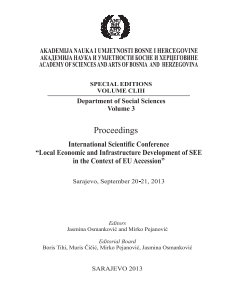FISCAL FEDERALISM AND BORROWING OPPORTUNITIES OF LOCAL COMMUNITIES
FISCAL FEDERALISM AND BORROWING OPPORTUNITIES OF LOCAL COMMUNITIES
Author(s): Željko Rička, Izudin Kešetović
Subject(s): Governance, Economic policy, Economic development, Public Finances, Fiscal Politics / Budgeting
Published by: Akademija Nauka i Umjetnosti Bosne i Hercegovine
Keywords: Fiscal federalism; Local communities; Fiscal equalization; Public debt; Budget; Public-private partnerships; Emission of municipal bonds;
Summary/Abstract: The principles of the European Charter of Local Self-Government were accepted and incorporated in the legislation of Bosnia and Herzegovina. Fiscal federalism is classified in the area of public finance theory that studies the system of collection and distribution of resources in the public sector with two or more levels of government. In practice, in the public sector we have an increasing presence of a trend of decentralization of powers and jurisdictions of the state through: the transfer of political power and the transfer of influence from higher to lower levels of government. Decentralization achieves some of the following goals: reducing the share of public sector in the overall economy, mobilization of public revenues while reducing the cost of public services, harmonization of responsibilities for local public expenditures and the available financial resources, boosting of own revenues of local authorities, promotion of cooperation between different levels of fiscal government in provision of public services. Characteristic of the mechanisms of financing of local government units in Bosnia and Herzegovina are different levels of development, which is why there is a need to find financing models that would meet the needs of local population and achieve the highest possible level of harmonization of standards, as well as a higher degree of fiscal decentralization. The theory and practice developed the forms of financial equalization: vertical financial equalization and horizontal financial equalization. According to the principles of the European Charter on Local Self-Government, local authorities have the right to adequate sources of financing which they shall freely use within the framework of their powers. Funding sources should be appropriate to their powers. Objectification of allocation of public revenues by levels of state organization is achieved through harmonized policy for allocation of public revenue and fiscal equalization policy at all levels of government. A significant part of the local units’ budget is quite meagre and strict. This is particularly true in local units in which most of the revenues are non-tax revenues. These non-tax revenues have established intended use (mostly for the cost of maintenance functions of the local community and large constructions). Such tying of revenue with precisely set use prevents local governments to be more flexible in allocation of budgetary resources. Based on the analysis of debt and borrowing of local government units, as well as research, we came to an assessment that there are real conditions and opportunities for local government borrowing in Bosnia and Herzegovina. Local units mainly borrow from a bank (or banks) in which they have deposited funds and whose accounts are used for cash management. There are few incentives and initiatives for borrowing by issuing of municipal bonds. One limitation is the lack of interest or knowledge to present all the costs and benefits of planned capital investments and to assess the financial potential and ability to repay debt. Promising modalities of financing of local communities in Bosnia and Herzegovina are those of public-private partnerships and emissions of municipal bonds that would require reliable demonstration of justification of borrowing purposes at the time of approval.
- Page Range: 383-400
- Page Count: 18
- Publication Year: 2013
- Language: English
- Content File-PDF

